Catholic Customs
 |
 |
 |
 |
 |
 |
 |
Farewell to the Alleluia
For the medieval man, with his deeper love for the liturgy of the Church, the significance of every word was felt with a great sensitivity.
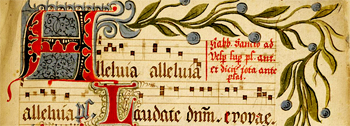 One of the most important words heard at Mass and during the Divine Office was the Alleluia. The very word filled the soul of the innocent medieval man with heavenly joy. It is one of the only Hebrew words used in liturgy that the Church thought incapable of translation because of its sacred origin; another is the Amen.
One of the most important words heard at Mass and during the Divine Office was the Alleluia. The very word filled the soul of the innocent medieval man with heavenly joy. It is one of the only Hebrew words used in liturgy that the Church thought incapable of translation because of its sacred origin; another is the Amen.
St. Isidore of Seville explains the sacrality of the “Alleluia” in his Etymologies:
“For so holy are these words that even John in the Apocalypse tells that when the Spirit revealed it to him he saw and heard the voice of the Heavenly Host like the voice of many waters and mighty thunder, saying Amen and Alleluia (Apoc. 19:4, 6). And because of this it is fitting for both words to be spoken on earth just as they resound in Heaven (VI,xix,19).” (1)
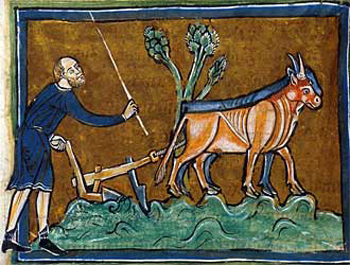 Farmers, sailors and tradesmen would sing songs containing sweet “Alleluias” as they worked, their hearts turned joyfully and gratefully to Christ who died to open to them the Gates of Heaven.
Farmers, sailors and tradesmen would sing songs containing sweet “Alleluias” as they worked, their hearts turned joyfully and gratefully to Christ who died to open to them the Gates of Heaven.
St. Jerome describes the Christian Romans of his days: “Wherever one turns the laborer at his plough sings Alleluia, the toiling mower cheers himself with psalms, and the vine-dresser while he prunes his vine sings one of the lays of David. These are the songs of the country; these, in popular phrase, its love ditties: these the shepherd whistles; these the tiller uses to aid his toil.” (Letter XLVI, Paula and Eustochium to Marcella)
The battlecry Alleluia! brings a swift victory
St. Jerome advised mothers to teach their babes to say Alleluia, praising instances in which he saw this practice faithfully observed: “When she sees her grandfather, she must leap upon his breast, put her arms round his neck, and, whether he likes it or not, sing Alleluia in his ears.” (Letter CVII. To Laeta) The Alleluia resounded in the hearts and voices of Catholics from cradle to death.
Not only did the Alleluia sound in the hearts of men during peacetime; the Alleluia brought victory in the perils of battle. Venerable Bede describes an instance when the cry of Alleluia won a battle for the Britons in the 5th century.
In of his Ecclesiastical History (book 1, ch. 20), he described the war that the united forces of the Saxons and Picts made upon the Britons, who were thus compelled to take up arms:
“The Britons, thinking themselves unequal to their enemies, implored the assistance of the Holy Bishops; who, hastening to them as they had promised, inspired so much courage into these fearful people that one would have thought they had been joined by a mighty army. Thus, by these holy apostolic men, Christ Himself commanded in their camp.
“The holy days of Lent were also at hand, and were rendered more religious by the presence of the priests, insomuch that the people being instructed by daily sermons, resorted in crowds to be baptized; for most of the army desired admission to the saving water. A church was prepared with boughs for the feast of the Resurrection of Our Lord, and was so fitted up in that martial camp as if it were in a city.
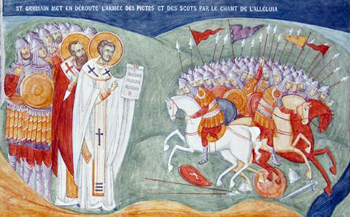 “The army advanced, still wet with the baptismal water; the faith of the people was strengthened and whereas human power had before been despaired of, the Divine assistance was now relied upon.
“The army advanced, still wet with the baptismal water; the faith of the people was strengthened and whereas human power had before been despaired of, the Divine assistance was now relied upon.
“The enemy received advice of the state of the army, and not questioning their success against an unarmed multitude, hastened forwards. But their approach was, by the scouts, made known to the Britons; the greater part of whose forces having just come from the font after the celebration of Easter, and preparing to arm and carry on the war.
“(Saint) Germanus declared he would be their leader. He picked out the most active, viewed country round about, and observed, in the way by which the enemy was expected, a valley encompassed with hills. In that place he drew up his inexperienced troops, himself acting as their general.
“A multitude of fierce enemies drew near, visible, as they approached to his men lying in ambush. Then Germanus, bearing in his hands the standard, exhorted his men and bade them all in a loud voice to repeat his words.
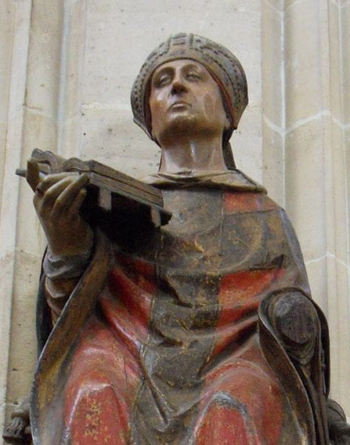 “As the enemy advanced in all security, thinking to take them by surprise, the Bishops three times cried, Alleluia!. A universal shout of the same word followed, and the hills resounded the echo on all sides.
“As the enemy advanced in all security, thinking to take them by surprise, the Bishops three times cried, Alleluia!. A universal shout of the same word followed, and the hills resounded the echo on all sides.
“The enemy was struck with dread, fearing that not only the neighboring rocks but even the very skies were falling upon them; and such was their terror that their feet were not swift enough to deliver them from it. They fled in disorder, casting away their arms, and well satisfied if, with unprotected bodies, they could escape the danger. Many of them, in their precipitate and hasty flight, were swallowed up by the river which they were passing.
“The Britons, without the loss of a man, beheld their vengeance complete, and became inactive spectators of their victory. The scattered spoils were gathered up, and the pious soldiers rejoiced in the success which Heaven had granted them. The Prelates thus triumphed over the enemy without bloodshed, and gained a victory by faith, without the aid of human force.”
The Alleluia is put away on Septuagesima Eve
Because of their love for the Alleluia, all the people – laity and clergy alike – felt a great sorrow at its disappearance on Septuagesima Sunday. In the year 1073 Pope Alexander II decreed that there should be a solemn suspension of the Alleluia on the Eve of Septuagesima Sunday after it was sung twice at the end of the Divine Office on Septuagesima Eve.
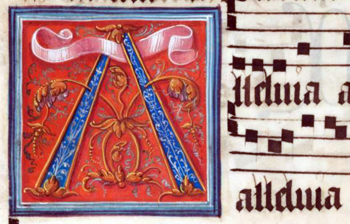 The Church in her wisdom allowed this simple ceremony to be elevated in some places to a solemn removal of the Alleluia to outwardly express the deepest sentiments of the faithful.
The Church in her wisdom allowed this simple ceremony to be elevated in some places to a solemn removal of the Alleluia to outwardly express the deepest sentiments of the faithful.
The various Churches followed this decree according to their unique spirits. The German Churches composed a beautiful hymn of farewell imploring all creatures to join her in singing the sacred word:
“Let the choir of the Blessed sing in the land of Paradise, Alleluia.
Nay, let the bright stars hymn one loud Alleluia.
Fleet clouds, swift winds, flashing lightning, and pealing thunder,
let all unite in a sweet Alleluia.
Waves and billow, showers and storms, tempest and calm, heat, cold,
snow, frost, woods and groves, let them tell their Alleluia.
And ye countless birds, sing the praises of your Maker with an Alleluia.
To which let the loud-voiced beasts respond another Alleluia.
Let the high mountain-tops ring with Alleluia.” (The Liturgical Year, Vole IV)
The Churches of France in the 1400s sang their “Alleluia, Dulcet Carmen” in their night offices for Septuagesima Eve. This beautiful hymn expresses the reasons for the suspension of the Alleluia:
“We are unworthy to sing a ceaseless Alleluia.
Our sins bid us interrupt our Alleluia.
The time is at hand when it behooves us to bewail our crimes.”
(The Liturgical Year, Vole IV)
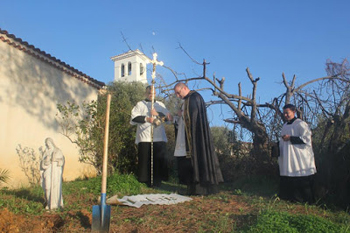
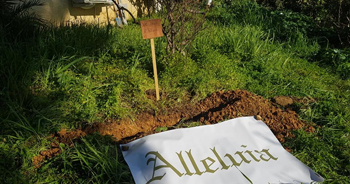 Some peoples desired to express their deep sentiments with in a more exterior way, such as theatrical displays of a quasi-liturgical character that expressed a farewell to the
Alleluia.
Some peoples desired to express their deep sentiments with in a more exterior way, such as theatrical displays of a quasi-liturgical character that expressed a farewell to the
Alleluia.
In these places, the Alleluia was not merely suspended, but a symbol of it – e.g. the word written in illuminated letters – was buried or burned. This burial or burning was always performed by the choir boys. In Paris, a straw effigy with a golden inscription of the Alleluia was carried in procession to the city square where it was ceremoniously burned.
The moving custom of a burial is described in a statute book of the Church of Tool from the 1400s:
“On Saturday before Septuagesima Sunday all choir boys gather in the sacristy during the prayer of the None to prepare for the burial of the Alleluia. After the last Benedicamus [i.e., last blessing] they march in procession with crosses, tapers, holy water and censers; and they carry a coffin, as in a funeral. Thus they proceed through the aisle, moaning and mourning, until they reach the cloister. There they bury the coffin; they sprinkle it with holy water and incense it; whereupon they return to the sacristy by the same way.” (Francis X. Weiser, The Easter Book, p. 159)
These beautiful customs express the Catholic spirit of the past that is so rare to find today: a spirit filled with ardor, tenderness and marvel able to grasp the symbolism and deeper meaning of God’s Word as seen through the eyes of the Church.
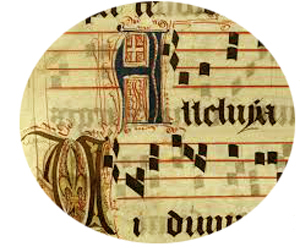

Posted February 10, 2021

St. Isidore of Seville explains the sacrality of the “Alleluia” in his Etymologies:
“For so holy are these words that even John in the Apocalypse tells that when the Spirit revealed it to him he saw and heard the voice of the Heavenly Host like the voice of many waters and mighty thunder, saying Amen and Alleluia (Apoc. 19:4, 6). And because of this it is fitting for both words to be spoken on earth just as they resound in Heaven (VI,xix,19).” (1)

St. Jerome describes the Christian Romans of his days: “Wherever one turns the laborer at his plough sings Alleluia, the toiling mower cheers himself with psalms, and the vine-dresser while he prunes his vine sings one of the lays of David. These are the songs of the country; these, in popular phrase, its love ditties: these the shepherd whistles; these the tiller uses to aid his toil.” (Letter XLVI, Paula and Eustochium to Marcella)
The battlecry Alleluia! brings a swift victory
St. Jerome advised mothers to teach their babes to say Alleluia, praising instances in which he saw this practice faithfully observed: “When she sees her grandfather, she must leap upon his breast, put her arms round his neck, and, whether he likes it or not, sing Alleluia in his ears.” (Letter CVII. To Laeta) The Alleluia resounded in the hearts and voices of Catholics from cradle to death.
Not only did the Alleluia sound in the hearts of men during peacetime; the Alleluia brought victory in the perils of battle. Venerable Bede describes an instance when the cry of Alleluia won a battle for the Britons in the 5th century.
In of his Ecclesiastical History (book 1, ch. 20), he described the war that the united forces of the Saxons and Picts made upon the Britons, who were thus compelled to take up arms:
“The Britons, thinking themselves unequal to their enemies, implored the assistance of the Holy Bishops; who, hastening to them as they had promised, inspired so much courage into these fearful people that one would have thought they had been joined by a mighty army. Thus, by these holy apostolic men, Christ Himself commanded in their camp.
“The holy days of Lent were also at hand, and were rendered more religious by the presence of the priests, insomuch that the people being instructed by daily sermons, resorted in crowds to be baptized; for most of the army desired admission to the saving water. A church was prepared with boughs for the feast of the Resurrection of Our Lord, and was so fitted up in that martial camp as if it were in a city.

Germanus of Auxerre leads the Britons to victory
with the militant cry Alleluia
“The enemy received advice of the state of the army, and not questioning their success against an unarmed multitude, hastened forwards. But their approach was, by the scouts, made known to the Britons; the greater part of whose forces having just come from the font after the celebration of Easter, and preparing to arm and carry on the war.
“(Saint) Germanus declared he would be their leader. He picked out the most active, viewed country round about, and observed, in the way by which the enemy was expected, a valley encompassed with hills. In that place he drew up his inexperienced troops, himself acting as their general.
“A multitude of fierce enemies drew near, visible, as they approached to his men lying in ambush. Then Germanus, bearing in his hands the standard, exhorted his men and bade them all in a loud voice to repeat his words.

The Bishop-Saint Germanus of Auxerre combated the Pelagian heresy & led armies
“The enemy was struck with dread, fearing that not only the neighboring rocks but even the very skies were falling upon them; and such was their terror that their feet were not swift enough to deliver them from it. They fled in disorder, casting away their arms, and well satisfied if, with unprotected bodies, they could escape the danger. Many of them, in their precipitate and hasty flight, were swallowed up by the river which they were passing.
“The Britons, without the loss of a man, beheld their vengeance complete, and became inactive spectators of their victory. The scattered spoils were gathered up, and the pious soldiers rejoiced in the success which Heaven had granted them. The Prelates thus triumphed over the enemy without bloodshed, and gained a victory by faith, without the aid of human force.”
The Alleluia is put away on Septuagesima Eve
Because of their love for the Alleluia, all the people – laity and clergy alike – felt a great sorrow at its disappearance on Septuagesima Sunday. In the year 1073 Pope Alexander II decreed that there should be a solemn suspension of the Alleluia on the Eve of Septuagesima Sunday after it was sung twice at the end of the Divine Office on Septuagesima Eve.

The various Churches followed this decree according to their unique spirits. The German Churches composed a beautiful hymn of farewell imploring all creatures to join her in singing the sacred word:
“Let the choir of the Blessed sing in the land of Paradise, Alleluia.
Nay, let the bright stars hymn one loud Alleluia.
Fleet clouds, swift winds, flashing lightning, and pealing thunder,
let all unite in a sweet Alleluia.
Waves and billow, showers and storms, tempest and calm, heat, cold,
snow, frost, woods and groves, let them tell their Alleluia.
And ye countless birds, sing the praises of your Maker with an Alleluia.
To which let the loud-voiced beasts respond another Alleluia.
Let the high mountain-tops ring with Alleluia.” (The Liturgical Year, Vole IV)
The Churches of France in the 1400s sang their “Alleluia, Dulcet Carmen” in their night offices for Septuagesima Eve. This beautiful hymn expresses the reasons for the suspension of the Alleluia:
“We are unworthy to sing a ceaseless Alleluia.
Our sins bid us interrupt our Alleluia.
The time is at hand when it behooves us to bewail our crimes.”
(The Liturgical Year, Vole IV)

Traditionalists in La-Londe-les-Maures, France revive the custom, the priest wearing the black funeral cope

In these places, the Alleluia was not merely suspended, but a symbol of it – e.g. the word written in illuminated letters – was buried or burned. This burial or burning was always performed by the choir boys. In Paris, a straw effigy with a golden inscription of the Alleluia was carried in procession to the city square where it was ceremoniously burned.
The moving custom of a burial is described in a statute book of the Church of Tool from the 1400s:
“On Saturday before Septuagesima Sunday all choir boys gather in the sacristy during the prayer of the None to prepare for the burial of the Alleluia. After the last Benedicamus [i.e., last blessing] they march in procession with crosses, tapers, holy water and censers; and they carry a coffin, as in a funeral. Thus they proceed through the aisle, moaning and mourning, until they reach the cloister. There they bury the coffin; they sprinkle it with holy water and incense it; whereupon they return to the sacristy by the same way.” (Francis X. Weiser, The Easter Book, p. 159)
These beautiful customs express the Catholic spirit of the past that is so rare to find today: a spirit filled with ardor, tenderness and marvel able to grasp the symbolism and deeper meaning of God’s Word as seen through the eyes of the Church.


Posted February 10, 2021
______________________
______________________
 |
 |
 |
 |
 |
 |


